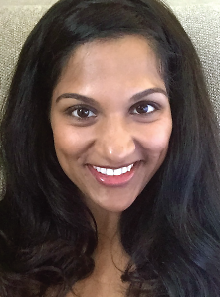It is time to think about shaking up the way psychiatrists think about improving the quality and delivery of mental health care, according to Nina Vasan, M.D., a PGY-3 psychiatry resident at Stanford University.
Vasan, an American Psychiatric Leadership Fellow, will tackle that assignment in the Psychiatry Innovation Lab at APA’s Annual Meeting in Atlanta.
“Compared with other medical fields, psychiatrists have been slower to realize the potential of the tools that are driving the next revolution in health care, such as technology, big data, and outcomes measurement,” Vasan told Psychiatric News.
Vasan isn’t planning a lecture or a conventional symposium to rectify that difference. Instead, she proposes an interactive session, a “psychiatry learning lab,” where participants can pitch their ideas about which problems to solve and then suggest apps or tools or systems to solve them. A panel of expert judges will then offer their responses to the proposals, refined by further discussion from the floor.
Judges who have agreed to comment on the pitches include Mary Giliberti, J.D., executive director of the National Alliance on Mental Illness; Dena Bravata, M.D., M.S., chief medical officer of Lyra Health; and Kana Enomoto, M.S., acting administrator of the Substance Abuse and Mental Health Services Administration.
Vasan was inspired by APA President Renée Binder, M.D.’s, talk to the American Psychiatric Leadership Fellows in which Binder asked them to be sure that psychiatrists were leading the future of mental health care delivery.
Ideas are great, she said. “But it’s not just the idea; it’s the implementation that determines the success of any proposal.”
Vasan has already laid out her approach to making innovation happen. She is the coauthor, with Stanford medical student Jennifer Przybylo, M.Phil., Do Good Well (Jossey-Bass, 2013), a book that explains an approach to solve social problems in ways that are “effective, collaborative, and sustainable.”
She combines some of those principles with other ways of stimulating innovation that have already been used successfully in the technology industry, business, hospitals, and conferences and on college campuses. A recent White House event focused on preventing suicide used a similar approach, she said.
“One of my favorite experiences as a student at Harvard Medical School was participating in Startup Weekend, a 54-hour event that brought together students from all academic backgrounds,” she said. After students pitched their ideas, they split into teams and worked together to develop a basic prototype of an app, website, organization, or service. “I see the potential of bringing that spirit to solving problems in mental health.”
Final plans for the program are still being worked out but will likely include advance submission of ideas, of which perhaps 10 will then be selected for inclusion in Atlanta. The judges will help teams refine the pitches, then decide which are the most meritorious.
“I hope this catalyzes a community within APA of people who are excited about using innovation technology and entrepreneurship to influence the future of psychiatry,” said Vasan. She’s not stopping there. “I’ve already submitted a proposal for the IPS: The Mental Health Services Conference in October building on what we learn in May.”
A second Learning Lab will convene a mock trial based on a hypothetical case in which a psychiatrist’s patient has committed suicide. The ensuing trial will feature APA President Binder as an expert witness and will be staffed by other psychiatrists and attorneys. Kristen Lambert, J.D., M.S.W., of insurer AWAC Services, will discuss cautionary risk management principles for attendees. ■

